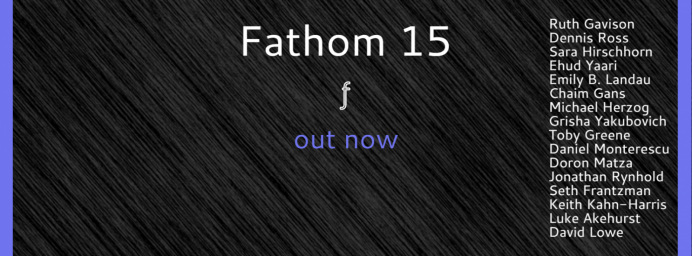The 19th century American essayist Ralph Waldo Emerson was not slow to offer pieces of advice. Many ended up as aphorisms, and one of his best was this: ‘insist upon yourself, be original.’ Fathom 15 is Emersonian through and through. Faced with a stasis in the peace process, worrying divisions within Israeli society, an ongoing regional melt-down and the dreary Israel-Palestine wars in western civil society, our writers spurn the stale talking points in favour of creative thinking and novel ideas.
Stasis and Peace
We have three pieces that, in different ways, think aloud about how to get past the stasis in the peace process.
Doron Matza, manager of the research division for strategy and policy in the Prime Minister’s Office from 1993 to 2014, proposes a new and important critical paradigm to understand the evolving relationship between the Israeli and Palestinian leaderships: ‘cooperation between rivals’.
Grisha Yakubovich, the former long-time number two at the division of Coordinator of Government Activities in the Territories (COGAT), sets out new ideas, based on his deep knowledge of what is possible, to change the reality in Gaza and shape the evolution of Hamas.
We also carry a fascinating panel discussion between experts Dennis Ross, Sara Hirschhorn, Michael Herzog, Jonathan Rynhold and Ehud Yaari about the likely impact of a Trump presidency.
Polarisation and Society
What resources do political theory and urban anthropology, respectively, offer for a critical understanding of the manifold social divisions and political contentions of Israeli society? Chaim Gans’s book A Political Theory for the Jewish People is arguably the most sophisticated and extended attempt we have to ground the justification for the Zionist project – or at least a certain version of that project – in the modes of thinking, the systems of concepts, the analytical resources and the language of political theory. Alan Johnson talked at length to Gans, professor in the Buchmann Faculty of Law at Tel Aviv University, about his book and the ‘Egalitarian Zionism’ to which he is committed.
Ruth Gavison, Israeli Law professor at the Hebrew University of Jerusalem, contributes not only an explanation of the growing polarisation inside Israel about the relationship between Jewish self-determination, human rights and democracy, but also a proposal: ‘democracy is the way for a demos of various identities to think together about how to structure their life together.’
In a wide-ranging interview, Daniel Monterescu, author of Jaffa Shared and Shattered. Contrived Coexistence in Israel / Palestine, explores Israel’s ‘mixed cities’ as a ‘political and social laboratory where the traumas of dispossession and the hopes for a better future play out in everyday life.’
David Grossman’s new novel A Horse walks into a Bar, in Jessica Cohen’s accomplished translation, receives a finely balanced appreciation from Liam Hoare.
Insecurity and the Region
Israeli security in an unstable region is the subject of three pieces. Emily Landau, senior research fellow at the Institute for National Security Studies (INSS) in Tel Aviv, and head of the Arms Control and Regional Security Program sets out why the incoming Trump administration should maintain the Iran deal but to take a series of steps to improve it.
Seth Frantzman, currently The Jerusalem Post‘s op-ed editor, notes that Mosul has suffered three jihadist takeovers since 2004 and, in a detailed mapping of the conflict and its actors, demands that the impending military defeat of Islamic State (ISIS) is made the basis for this long-suffering city to carve out a different political future this time.
David Lowe reviews Michael Doran’s Ike’s Gamble: America’s Rise to Dominance in the Middle East.
Delegitimisation in the West
2017 will be 100 years since the Balfour Declaration and 50 Years since the 1967 war and the resulting occupation. With every chance that these anniversaries to amplify the dreary megaphone war that rages in parts of western civil society, we are happy to publish some more nuanced voices.
Toby Greene issues an eloquent plea to use the Balfour centenary in Britain to look forward. The Balfour Declaration was a statement of aspiration. It declared what Britain viewed with favour, and what it would use its best endeavours to bring about. What should Britain view with favour today, he asks?
Keith Kahn-Harris reviews Ruth Sheldon’s Tragic Encounters and Ordinary Ethics: Palestine-Israel in British Universities, a book based on detailed ethnographic fieldwork conducted between 2010 and 2012 with students involved in pro-Israel and pro-Palestinian activism in three UK universities. He finds a useful contrast between the productive conversations that can happen in lectures and seminars and informal spaces and the unproductive drama of so many ‘public’ events in the university space.
Luke Akehurst reviews Dreams Deferred: A Concise Guide to the Israeli-Palestinian Conflict & the Movement to Boycott Israel, edited by Cary Nelson.
The Inbetweeners
As ever, since the last quarterly issue of Fathom the editors have published what we like to call, in homage to a British sitcom, ‘the inbetweeners’. In fact, we find we have posted almost a full issue’s worth of inbetweeners! Did you miss any of these pieces?
Dahlia Scheindlin, Lessons from Cyprus for Israel-Palestine
Claire Spencer, The old ways have had their day. Peace-making will look very different in the era of Trump
Peter Neumann, Returning Jihadis: A Generational Threat
Shany Mor, Trump, Israel and the Jews: What Happens Next?
Neill Lochery, The Resistible Rise of Benjamin Netanyahu: An Interview with Neill Lochery
Joel Braunold and John Lyndon, Opinion among the young is drifting. An international fund for Israeli-Palestinian peace is urgently needed
Michael Herzog, The Israeli-Palestinian Arena: What can be done short of an agreement?
Dave Rich on his book ‘The Left’s Jewish Problem’

































